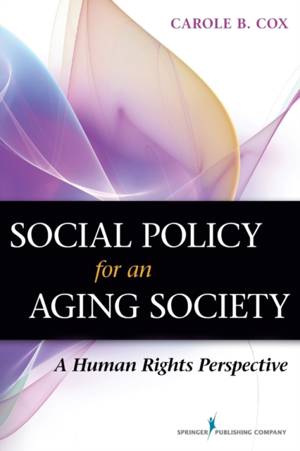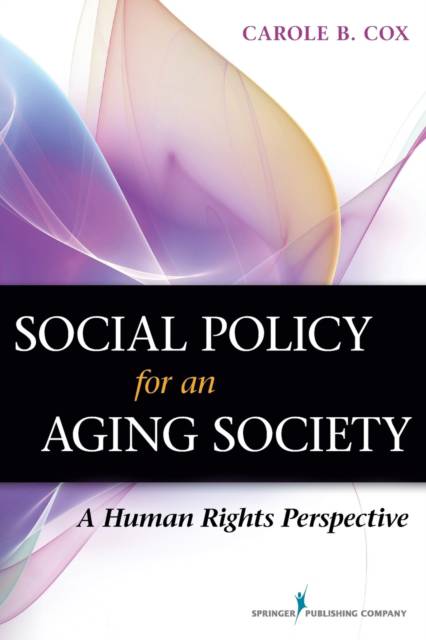
- Afhalen na 1 uur in een winkel met voorraad
- Gratis thuislevering in België vanaf € 30
- Ruim aanbod met 7 miljoen producten
- Afhalen na 1 uur in een winkel met voorraad
- Gratis thuislevering in België vanaf € 30
- Ruim aanbod met 7 miljoen producten
Omschrijving
"This semester I will be teaching a new undergraduate social work elective at Lehman that is about aging policy. I had searched for months for a book thatwould be appropriate for this course. I did not find anything until I received an online advertisement from Springer that included Social Policy for anAging Society. I requested an examination copy and decided immediately after reviewing it that this is the book that is perfect for this course. Itcertainly fills a significant gap in textbooks available for gerontological courses. I value the fact that it emphasizes a human rights perspective that isconsistent with an orientation of our social work department at Lehman."
-- Patricia Kolb, Ph.D., Professor, Department of Social Work, Lehman College, City University of New York
As people age, they are at increased risk of having their basic human rights threatened or violated. When age is perceived as incompetence, it can easily lead to discrimination that impacts human rights. Based on the premise that social policy must reflect human rights principles, this graduate-level textbook views the challenges associated with aging as opportunities for policy development that stresses the rights of older adults rather than needs. The text distinguishes between "needs" and "rights" and describes those policies and services that best ensure that the rights of older adults are actually met√>=particularly programs that enable people to remain in their own communities so they can benefit from continued integration and participation in society. Issues and challenges surrounding such efforts, and gaps in social policies faced by specific subsets of older people, are critically examined.
The book first analyzes current aging policies and rights and considers the Older Americans Act as a basic policy framework. With an eye to promoting independence, the book discusses issues of income, housing, transportation, health, and home care and what constitutes a "livable community," along with policies that promote wellbeing and focus on preventing senior abuse and exploitation. Challenges faced by older workers are covered, as are issues particular to family caregivers, older women, and grandparents as caregivers. Gaps in social policies for LG BT seniors and older members of specific ethnic groups are discussed. Particular attention is given to global issues and aging policies in diverse countries and the ways in which they reflect human rights concerns. Each chapter concludes with probing discussion questions for classroom use.
KEY FEATURES:
- Presents a human rights framework for aging policy
- Distinguishes between needs and rights of older persons
- Focuses on policies and programs that can help older people to remain in the community
- Explores the issues and challenges of specific older populations
- Discusses global responses and concerns with regard to older persons and human rights
Carole B. Cox, MSW, PhD, is professor at the Graduate School of Social Service, Fordham University. She is a fellow of the Gerontological Society of America and a Fulbright scholar. She is the author of more than 50 journal articles and chapters dealing with various aspects of aging and caregiving, with extensive research on caregivers for persons with dementia, their needs, and their use of services. Her recent work includes a study of the impact of dementia on the workplace. Her caregiving research also includes that of grandparents raising grandchildren, leading to the development of a curriculum, Empowering Grandparents Raising Grandchildren: A Training Manual for Group Leaders (Springer Publishing Company, 2000). She is the editor of To Grandmother's House We Go and Stay: Perspectives on Custodial Grandparents (Springer Publishing Company, 2000). Her other books include Home Care for the Elderly: An International Perspective, coauthored with Abraham Monk (1991); The Frail Elderly: Problems, Needs, and Community Responses (1993); Ethnicity and Social Work Practice, coauthored with Paul Ephross (1998); Community Care for an Aging Society: Policies and Services (Springer Publishing Company, 2005); and Dementia and Social Work Practice (Springer Publishing Company, 2007).
Specificaties
Betrokkenen
- Auteur(s):
- Uitgeverij:
Inhoud
- Aantal bladzijden:
- 224
- Taal:
- Engels
Eigenschappen
- Productcode (EAN):
- 9780826196538
- Verschijningsdatum:
- 16/01/2015
- Uitvoering:
- Paperback
- Formaat:
- Trade paperback (VS)
- Afmetingen:
- 178 mm x 223 mm
- Gewicht:
- 308 g

Alleen bij Standaard Boekhandel
Beoordelingen
We publiceren alleen reviews die voldoen aan de voorwaarden voor reviews. Bekijk onze voorwaarden voor reviews.











